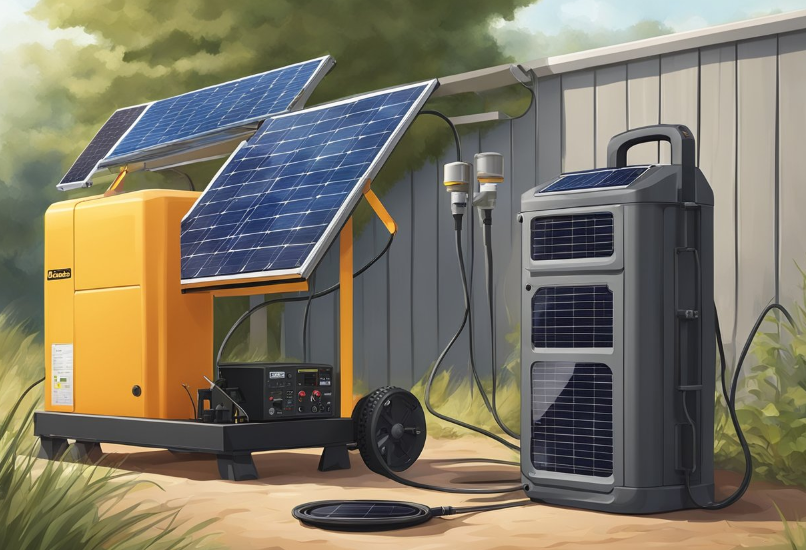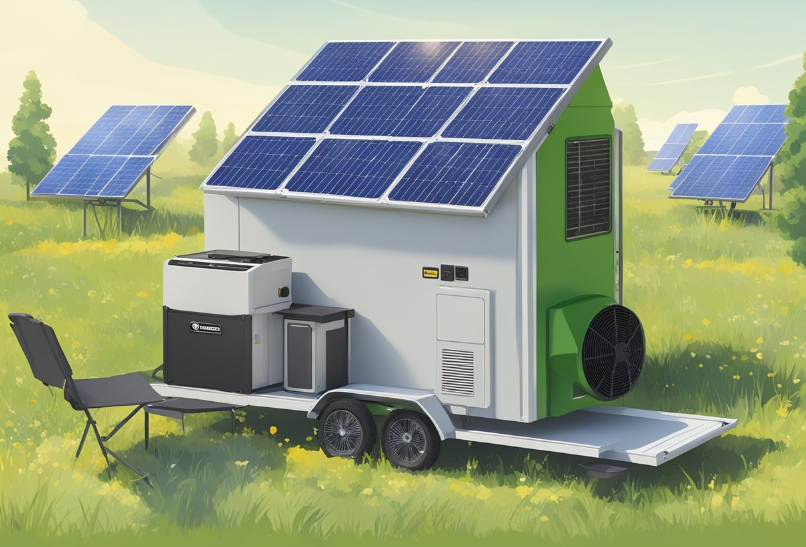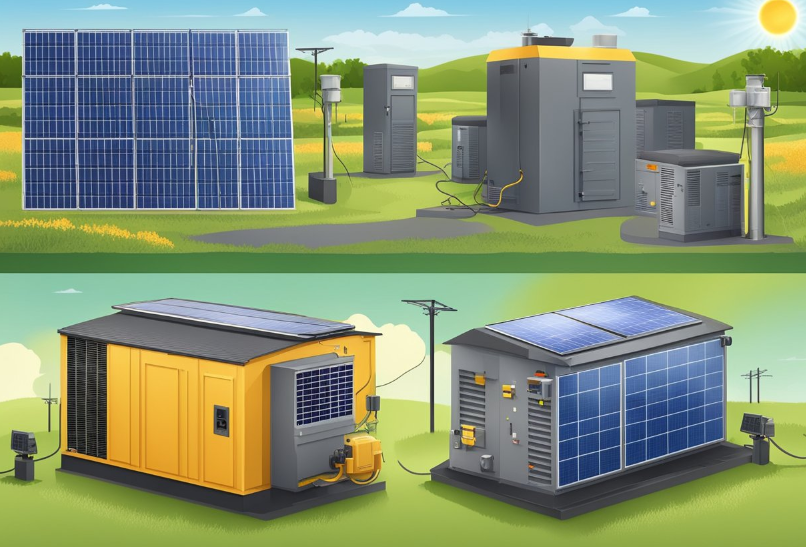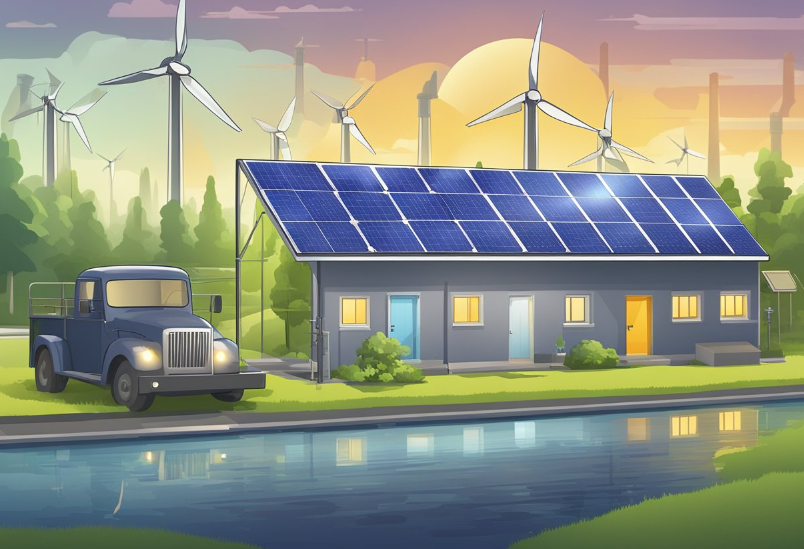Solar Powered Portable Power Stations vs Traditional Generators: A Comparison
If you are considering your options for portable power whether for emergency preparedness or when away from home, there are two alternatives for you to look at. Portable solar powered power stations and traditional portable generators each have their pluses and minuses. We explore the advantages and disadvantages of both options in this article which examines solar powered portable power stations vs traditional generators.
Understanding Power Stations

When it comes to portable power solutions, there are two main options: solar-powered stations and traditional generators. Each has its own advantages and disadvantages, and understanding the differences between them can help you choose the best option for your needs.
Solar Powered Stations
Solar-powered power stations are becoming increasingly popular due to their eco-friendliness and portability. They are essentially large batteries that can be charged using solar panels, making them a great option for outdoor activities or emergency situations.
Some advantages of solar-powered stations, they
- are silent and emit no harmful emissions.
- are easy to use and require little maintenance.
- can be recharged using solar panels, making them a great option for off-grid use.
However, there are some limitations to solar-powered stations, including that they:
- are typically less powerful than traditional generators.
- require sunlight to recharge, which can be a problem in cloudy or rainy weather.
- can be more expensive than traditional generators.
Traditional Generators
Traditional generators are powered by gasoline or diesel fuel and are capable of producing a large amount of power. They are often used for construction sites, RVs, and other situations where a lot of power is needed.
Some advantages of traditional generators are that they:
- are typically more powerful than solar-powered stations.
- can be used in any weather conditions.
- are often less expensive than solar-powered stations.
However, there are some downsides to traditional generators. They:
- are noisy and emit harmful emissions.
- require regular maintenance and fueling.
- are not eco-friendly.
Both solar-powered stations and traditional generators have their pros and cons. When choosing between the two, consider your specific needs and circumstances to determine which option is best for you.
Efficiency Comparison

When it comes to efficiency, solar-powered portable power stations have a clear advantage over traditional generators. This is because solar generators can generate energy using solar panels, which means they do not require any fuel to run. On the other hand, traditional generators require fuel to run, which means they produce emissions and require regular maintenance.
In terms of energy conversion efficiency, solar-powered portable power stations are also superior to traditional generators. This is because solar generators use rechargeable batteries to store and provide energy when needed, which means they can operate at a higher efficiency rate. In contrast, traditional generators use mechanical engines to convert fuel into energy, which means they are less efficient and produce more waste.
Another advantage of solar-powered portable power stations is their ability to recharge using solar panels. This means that as long as there is sunlight, the solar generator can continue to recharge its batteries, providing a constant source of energy. In contrast, traditional generators require regular refueling, which can be a hassle and may not always be possible in remote locations.
Overall, when it comes to efficiency, solar-powered portable power stations are the clear winner over traditional generators. They are more efficient, produce less waste, and do not require any fuel to run. This makes them an ideal choice for those who want a reliable and sustainable source of energy, especially in remote locations where traditional generators may not be practical.
Environmental Impact

When it comes to environmental impact, solar-powered portable power stations are the clear winner. Traditional generators rely on fossil fuels like gasoline or diesel, which release harmful emissions into the air when burned. This not only contributes to air pollution but also contributes to climate change.
On the other hand, solar-powered portable power stations rely on renewable energy from the sun. This means they do not produce any harmful emissions or contribute to climate change. Not only is this better for the environment, but it also means that solar-powered portable power stations can be used in areas where traditional generators are not allowed due to emissions regulations.
Another benefit of solar-powered portable power stations is that they do not require any fuel to operate. This means that you do not need to worry about storing or transporting gasoline or diesel, which can be dangerous and expensive. Solar-powered portable power stations only require sunlight to recharge, which is free and abundant.
Overall, when it comes to environmental impact, solar-powered portable power stations are the clear winner over traditional generators. They are better for the environment, do not require any fuel, and can be used in areas where traditional generators are not allowed.
Cost Analysis

When it comes to comparing solar-powered portable power stations and traditional generators, one of the most important factors to consider is cost. Here, we'll break down the initial investment and long-term costs of both options.
Initial Investment
The initial investment for a solar-powered portable power station is typically higher than that of a traditional generator. However, it's important to consider that the investment includes not only the power station itself but also any necessary solar panels. On the other hand, traditional generators require fuel, which is an ongoing cost.
Long Term Costs
Over the long term, solar-powered portable power stations tend to be more cost-effective than traditional generators. This is because once you've made the initial investment in solar panels and a power station, you don't have to pay for fuel. In addition, solar panels and power stations require very little maintenance, whereas traditional generators require regular maintenance and repairs.
Overall, while the initial investment in a solar-powered portable power station may be higher than that of a traditional generator, the long-term cost savings make it a more cost-effective option.
Portability and Convenience
When it comes to portability and convenience, solar-powered portable power stations have a clear advantage over traditional generators. Portable power stations are lightweight and compact, making them easy to transport and store. They can be carried by hand or in a backpack, and they don't take up much space in your vehicle or at your campsite.
In contrast, traditional generators are heavy and bulky, requiring a dedicated space to store and transport. They often require a trailer or vehicle with a hitch to move them, and they can be difficult to maneuver in tight spaces. This makes them less convenient for outdoor activities like camping, hiking, or tailgating.
In addition to their portability, solar-powered portable power stations are also easy to use. They don't require any fuel or oil changes, which can be messy and time-consuming. Instead, they can be charged using solar panels or a wall outlet, and they can be used right away without any setup or maintenance.
On the other hand, traditional generators require fuel and oil changes, which can be messy and time-consuming. They also require regular maintenance to keep them running smoothly, which can be costly and time-consuming. This makes them less convenient for outdoor activities, where you want to spend your time enjoying nature rather than maintaining your generator.
Overall, when it comes to portability and convenience, solar-powered portable power stations are the clear winner. They are lightweight, compact, and easy to use, making them perfect for outdoor activities and off-grid living.
Maintenance and Lifespan
When it comes to maintenance, solar-powered portable power stations require very little upkeep. They have no moving parts and do not require oil changes or other regular maintenance tasks like traditional generators do. However, you will need to keep the solar panels clean and free of debris to ensure they are generating maximum power.
On the other hand, traditional generators require regular maintenance such as oil changes, air filter replacements, and spark plug replacements. They also need to be run periodically to prevent the fuel from going stale and causing damage to the engine.
In terms of lifespan, solar-powered portable power stations have a longer lifespan than traditional generators. They have no internal combustion engine, which means they have fewer parts that can wear out or break down. Additionally, they have a longer warranty period, with some models offering up to 5 years of coverage.
Traditional generators, on the other hand, have a shorter lifespan due to the wear and tear on the engine and other mechanical parts. They also have a shorter warranty period, typically around 2 years.
Overall, if you're looking for a power source that requires minimal maintenance and has a longer lifespan, a solar-powered portable power station is the way to go. However, if you need a power source that can run for longer periods of time and can handle heavier loads, a traditional generator may be a better option.
Frequently Asked Questions
What are the advantages of using a solar-powered portable power station over a traditional generator?
Solar-powered portable power stations are more eco-friendly than traditional generators, producing no emissions and requiring no fuel. They are also quieter, lighter, and more portable, making them ideal for outdoor activities and emergencies. Additionally, solar-powered portable power stations are easier to maintain and have a longer lifespan than traditional generators.
How does the Jackery Power Station compare to traditional generators in terms of performance?
The Jackery Power Station is a high-capacity portable power station that can power multiple devices simultaneously. It has a built-in pure sine wave inverter that provides clean and stable power, making it safe for sensitive electronics. Compared to traditional generators, the Jackery Power Station is quieter, lighter, and more portable, making it ideal for outdoor activities and emergencies.
Are there any downsides to using a solar-powered portable power station instead of a traditional generator?
Solar-powered portable power stations rely on sunlight to recharge, so they may not be suitable for areas with little to no sunlight. Additionally, they may not be able to power high-energy appliances such as air conditioners and refrigerators for extended periods of time. However, advancements in technology have made solar-powered portable power stations more efficient and capable of powering a wider range of devices.
What are the benefits of using a solar-powered portable power station for home backup?
Solar-powered portable power stations can provide backup power during power outages, making them a reliable source of energy for essential appliances such as lights, phones, and medical devices. They are also more cost-effective and environmentally friendly than traditional generators. Additionally, solar-powered portable power stations can be used to power devices during outdoor activities such as camping and hiking.
How does a solar-powered portable power station compare to solar panels for generating electricity?
Solar-powered portable power stations are a self-contained unit that stores and delivers electricity, while solar panels generate electricity that must be stored in a separate battery. Solar panels require more maintenance and setup time than solar-powered portable power stations. However, solar panels can generate more electricity than solar-powered portable power stations, making them a better option for off-grid homes and businesses.
Which factors should be considered when choosing between a solar-powered portable power station and a traditional generator?
When choosing between a solar-powered portable power station and a traditional generator, factors such as power output, runtime, portability, noise level, and cost should be considered. Solar-powered portable power stations are more eco-friendly, quieter, and more portable than traditional generators, but may not be suitable for areas with little to no sunlight or for powering high-energy appliances for extended periods of time. Traditional generators are more powerful and can provide backup power for longer periods of time, but are louder, heavier, and require more maintenance.
